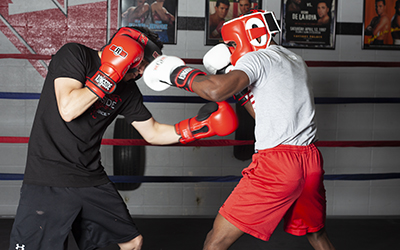
Sparring offers fighters, from Boxing to MMA to Judo, an opportunity to test their skills against real live opponents. The experience of facing off against another human, even in a controlled setting, teaches you things that you can’t learn from hitting a bag.
To get the most out of a sparring session, though, you don’t just step into the ring and start brawling. If you don’t take a few key things in mind when you set up your sparring session, you may end up doing more harm than good.
In today’s article, we’ll discuss what you should keep in mind before, during, and after every sparring session.
We intend to focus on the full, unrestricted sparring, rather than any of the restricted, situational sparring options. Full Sparring tends to be the style that many fighters have the most trouble learning to use effectively. A bad sparring session can even lead aspiring fighters to leave the sport entirely.
So let’s dive into how we keep sparring safe and useful.
Pick the Right Partner
The partner you spar against can make or break the experience. If you choose someone bigger, more experienced, or more skilled, you could find yourself constantly just defending yourself. At worst, you could end up taking a beating. There’s not much you can learn from that.
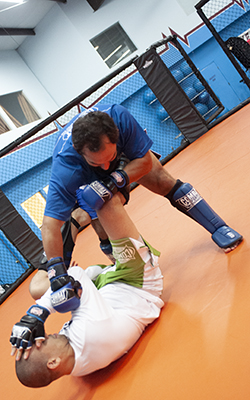
On the other hand, if you spar against someone who is not on your level, you may find yourself unchallenged or constantly holding back.
Find a partner whose skill level matches your own (or who’s willing and able to match your skill level). You will be challenged. You will experience a scenario that matches what you might find in legitimate competition. And you can work on training new skills without worrying about being knocked silly.
Head into the Ring with a Goal
As with any other aspect of training, you should enter the ring with a goal in mind. Are you focused on slipping punches? Or do you want to improve the fluidity of a particular combination? Your specific goal will affect how you set up your session and the mindset that you enter the ring with.
If you focus on learning to read and react to your opponent, you will enter the ring with a different mindset than if you are trying to dictate speed and rhythm and force your opponent to react to you.
Whatever you choose to focus on, prioritize it when the session starts. And then keep coming back to it. Don’t just fall back on the stuff you already know you’re good at.
Wear the Right Gear
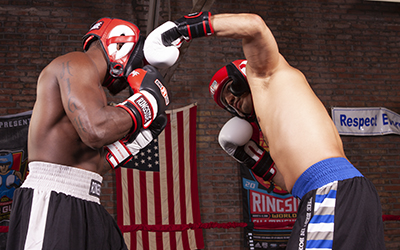
When you use sparring as a training tool, you want to minimize the risk of injury. Save the knock outs for the competitions. Wear the right protective gear to keep you safe, but still allow you all of your freedom of movement.
For many sports, gloves are a necessity. Boxing, MMA, Muay Thai, and many other combat sports require gloves for competition, so you should spar with them on as well.
Headgear is the next most important piece of gear. Protecting your head during sparring keeps you safe during what is supposed to be a training exercises. More importantly, it reduces your fear of being hit as well. Which will leave you free to focus on your training goals.
One thing to keep in mind when choosing your sparring headgear: remember to balance protecting with visibility. You should not choose a piece of gear that sacrifices too much ability to see the ring and your opponent in favor of padding. At then end of the day, seeing your opponent and dodging their attack is superior to getting hit in your headgear-protected head.
For sports that include kicking, you should opt for shin guards. These will keep your shins, feet and ankles protected from the damage of repeated blows during training. This, in turn, will allow you to train more and more often.
Lastly, make sure you have the proper footwear. You need something with adequate support and stability. But it must also allow you proper in-ring traction. It helps if your shoes are lightweight as well. Don’t waste energy by moving extra ounces every time you take a step.
Focus on Your Fundamentals
Keep your chin down and your hands up. Keep your chin covered. Stay loose and relaxed. Keep your eyes on your opponent and centered on their chest. Breathe.
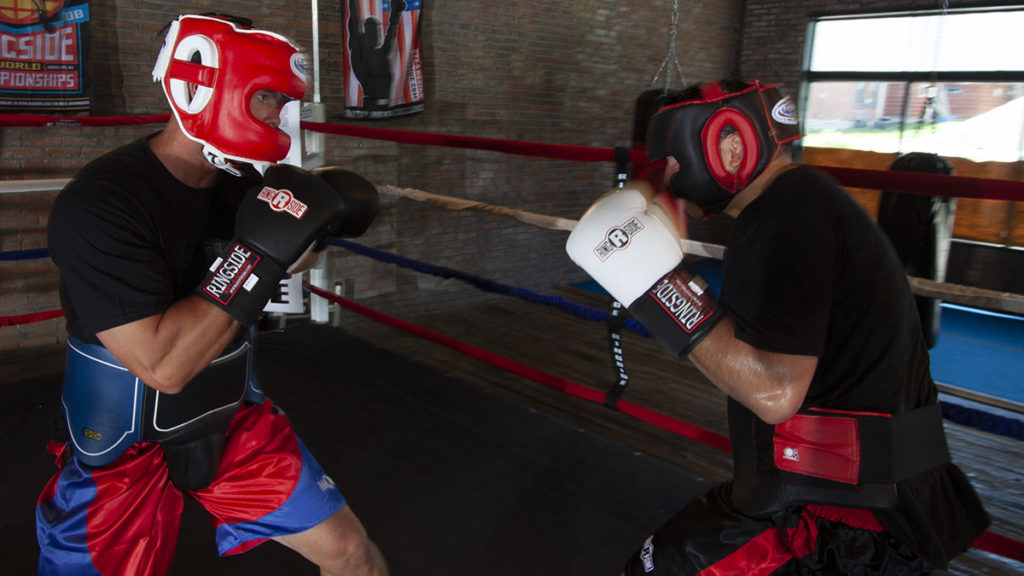
These are the fundamentals you practice all of the time. Whether you’re hitting the bag, the mitts, or nothing at all, you always practice these things. They are FUNDAMENTAL to a successful technique.
Once you enter the ring, you must remember to practice these things. Why? Because you fight the way you practice. If you’re fundamentals fall apart every time you spar, then they will fall apart in competition as well.
So, while it is important to have a plan, you can’t sacrifice your fundamentals.
Prepare to Get Hit
It doesn’t matter what gear you wear. It doesn’t matter what skills you work on. Once you step in the ring and touch gloves, you WILL get hit. If you’ve never taken a punch before, the prospect of getting hit may scare you. But you must prepare yourself for the inevitable contact that comes with sparring.
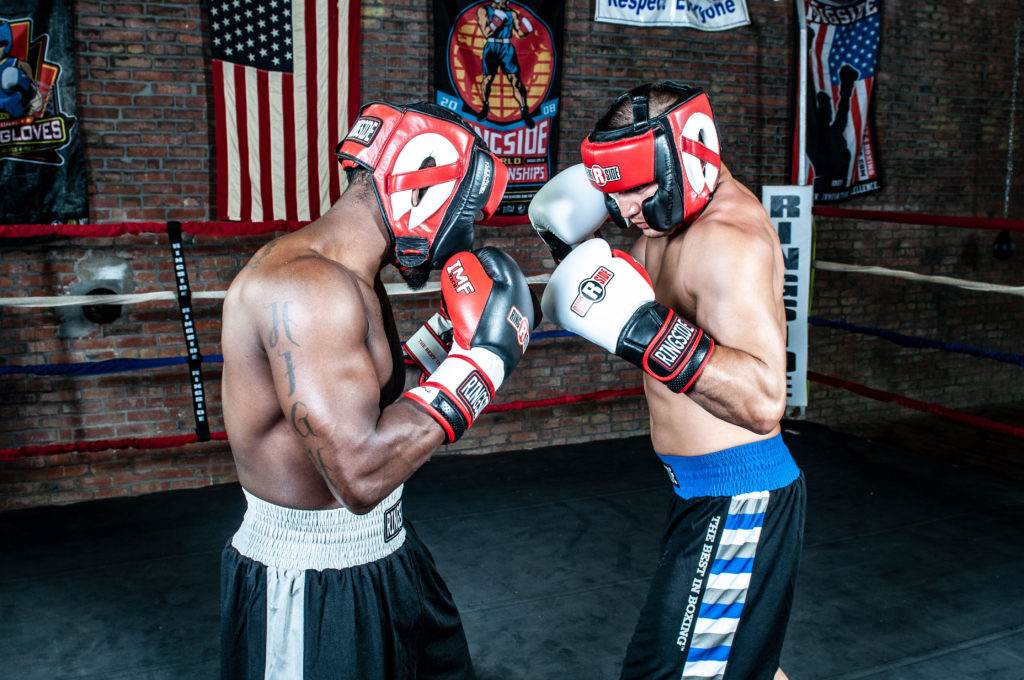
Knowing, and accepting, that the blows will come, helps you focus on the educational aspect of sparring. Instead of worrying about the incoming punches, you can instead keep your mind on the training goals you already established.
On the other hand, if you only pay attention to blocking or dodging incoming blows, you won’t be able to work on developing that new combination. You won’t be able to build your inside fighting skills. And, honestly, you won’t win a lot of matches when it comes time for competition.
If you consider these key elements when you step into the ring for a sparring session, you may just learn a thing or two. As we’ve said, sparring is a training tool. While there are certainly scenarios where you may spar “to win”, the goal is almost always to learn.


First-rate. Two things stand out: the importance of having a goal for each session and the need for good gear. I’d add that good gear is part of the fun of boxing. Why go through all this if you don’t look like a boxer in there? I would add a thought about fear. True, gear reduces fear. But in addition to the fear related to hits there is the fear of not looking good. Good gear reduces that fear, too. Good gear pumps up the boxer and builds confidence. We acquire polish as we acquire experience. Thanks for this article. Five stars from me!
Good info!
Thank you!+❤+